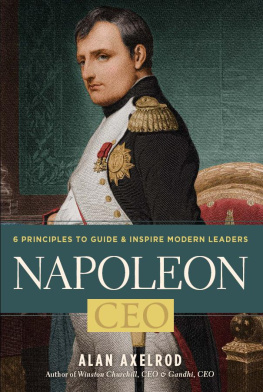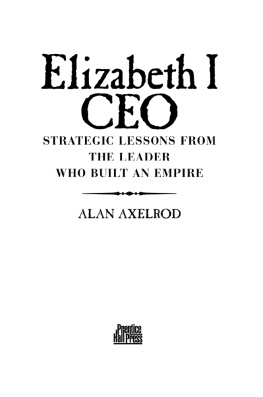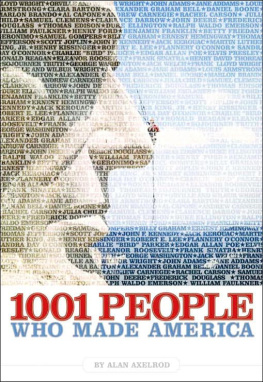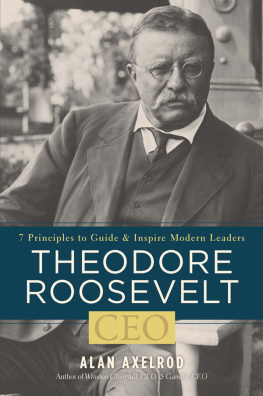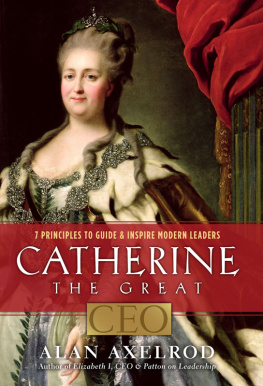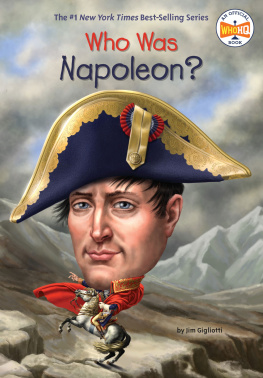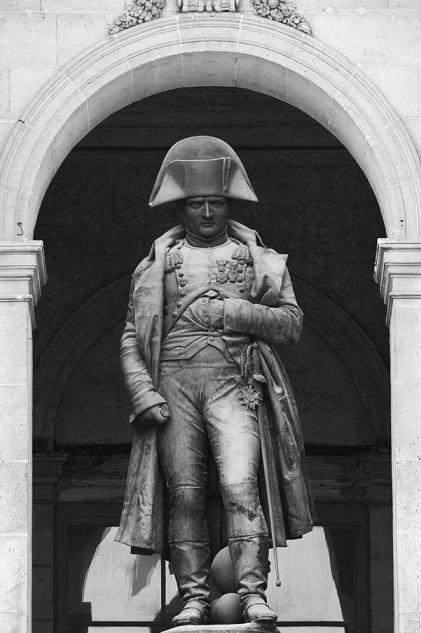
Napoleon statue (1833) in the balcony of Les Invalides, Paris. France, by Charles mile Seurre. Shutterstock/Jose Ignacio Soto
NAPOLEON, CEO

6 PRINCIPLES TO GUIDE &
INSPIRE MODERN LEADERS
ALAN AXELROD


An Imprint of Sterling Publishing
387 Park Avenue South
STERLING and the distinctive Sterling logo are registered trademarks
of Sterling Publishing Co., Inc.
2011 by Alan Axelrod
All rights reserved. No part of this publication may be reproduced, stored in a retrieval system, or transmitted, in any form or by any means, electronic, mechanical, photocopying, recording, or otherwise, without prior written permission from the publisher.
ISBN 978-1-4027-7906-0 (Hardcover)
ISBN 978-1-4027-8893-2 (ebook)
Library of Congress Cataloging-in-Publication Data
Axelrod, Alan, 1952
Napoleon, CEO : 6 principles to guide & inspire modern leaders / Alan Axelrod.
p. cm.
Includes bibliographical references and index.
ISBN 978-1-4027-7906-0
1. Leadership. 2. Chief executive officers. 3. Napoleon I, Emperor of the French, 1769-1821. I. Title.
HD57.7.A959 2011
658.4'092--dc22
2010051289
For information about custom editions, special sales, and premium and corporate purchases, please contact Sterling Special Sales at 800-805-5489 or specialsales@sterlingpublishing.com.
2 4 6 8 10 9 7 5 3 1
PICTURE CREDITS:
: Shutterstock/Jose Ignacio Soto
: Courtesy the Library of Congress Prints & Photographs Division / LC-DIG-ppmsc-05204
: From The Life of Napoleon Bonaparte, by W. H. Ireland, London: John Cumberland, 1828.
ForAnitaand Ian
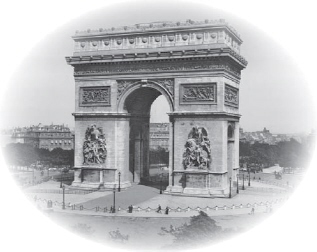
CONTENTS
Dont talk to me of goodness, of abstract justice, of natural law. Necessity is the highest law.
~Napoleon, during the Hundred Days, April 1815
He left France smaller than he found it, true; but you cant measure a nation like that. As far as France is concerned, he had to happen. Its rather like Versailles: it just had to be built. Dont let us haggle over greatness.
~President Charles de Gaulle, in conversation with his minister of culture, Andr Malraux, 1969
One hundred fourteen miles long and fifty-two miles wide, Corsica exploded into being through prehistoric volcanic eruptions in the Mediterranean Sea between Italy and France. Two-thirds of its roughly fourteen-hundred-square-mile area is rugged mountain country whose sharp contours reflect the violence of its geological birth. Napoleone di Buonaparte was born in the fiery islands principal town, Ajaccio, on August 15, 1769.
He was the second of the eight children born of attorney Carlo Maria Buonaparte and Maria Letizia Ramolino. Both parents were descended from minor Genoese nobility, who had settled in Corsicaa possession of Genoa since 1347during the sixteenth century. A dreary twenty-six-year revolutionary war began on the island in 1729, ending in 1755 with the founding of the Corsican Republic led by the charismatic nationalist Pasquale Paoli. Unable to drive the Genoese from the coastal cities even after the establishment of the republic, Paoli also proved unable to prevent Genoa from selling Corsica to France in 1764. Carlo Buonaparte became one of Paolis lieutenants in what rapidly developed into a guerrilla resistance movement against French occupation, and the infant Napoleone was named after Carlos brother, who was killed in this struggle.
Defeated in battle at Ponte Novu in 1769, Paoli fled to England, and Carlo Buonaparte made his own separate peace with the French, accepting appointment in 1777 as the Corsican representative to the court of King Louis XVI of France.
The turbulent politics of Corsica, with its passionate yet shifting allegiances, formed the background of Napoleones childhood, as did the more ancient traditions of blood feud and vendetta, which were as deadly serious on Corsica as in Sicily. Yet in the foreground of his early life stood not his father, who was often absent, on duty in the French court, but his mother, who ruled over him, his elder brother, Joseph, and his younger brothers and sistersLucien, Elisa, Louis, Pauline, Caroline, and Jrme with an iron hand firmly placed in a tender velvet glove. He was thus the child of violent political, national, and quasi-tribal strife yet also the product of a strong mother, who was in equal parts formidable and loving.
Student and Cadet
Although Napoleones early life unfolded on an island backwater steeped in conflict, he did reap the benefits of his familys local prominence and his fathers French connections. Whereas most Corsicans were destined to lives of provincial obscurity and relative poverty, Napoleone was packed off to attend a private school in Autun, France, in January 1779. Raised speaking Corsican, he rapidly learned French and in May gained admission to one of Frances twelve royal military academies, this one at Brienne-le-Chteau. His hastily acquired French was thick with the accents of his native island, and on this account, as well as for his dark Mediterranean complexion, he was teased mercilessly by the other cadets. Their taunts were intensified by his stubborn failure to be intimidated by them. The boy the others saw as a Corsican rube responded to abuse with the haughty disdain of Versailles royalty.
Doubtless, young Napoleone was lonely, but as he would do throughout his career, he converted adversity into opportunity. He used his isolation, which was both inflicted by others and self-imposed, to concentrate on study. His teachers noted his facility in history and geography, but they were most impressed by what seemed to border on genius in mathematics, especially geometry. Since geometry was vital to the art of navigation, he was advised to enter the navy. Those who counseled him assumed, of course, that he would join the French navy, but Napoleone knew that the British Royal Navy was preeminent in the world, and, feeling no particular allegiance to France, he seriously considered applying abroad. What stopped him was his admission, after completing the course of study at Brienne in 1784, to the cole Militaire in Paris, the premier military college of France. Here he found another application for his geometrical mastery, the artillery service.
Carlo Buonapartes death from stomach cancer in 1785 put the family in dire financial straits. Forced to cut short his studies at the cole Militaire, Napoleone submitted himself to immediate examination by no less a figure than Pierre-Simon Laplace, eighteenth-century Frances greatest mathematician, who certified his eligibility for graduation, even though he had completed but one year of the two-year program.
The Forge of Revolution
Napoleone di Buonaparte graduated in September 1785 with a commission as second lieutenant in an artillery regiment known as La Fre. He was assigned to the dull routine of garrison duty in Valence, Drme, and Auxonne, but, with the eruption of the French Revolution in 1789, he departed on a leave of absence that would consume nearly two years.
Next page
